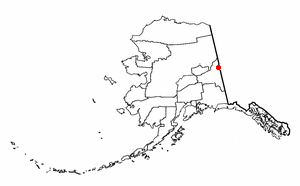Eagle Village, Alaska
| Eagle Village, Alaska | |
|---|---|
| CDP | |
 | |
| Coordinates: 64°46′53″N 141°6′53″W / 64.78139°N 141.11472°WCoordinates: 64°46′53″N 141°6′53″W / 64.78139°N 141.11472°W | |
| Country | United States |
| State | Alaska |
| Census Area | Southeast Fairbanks |
| Area | |
| • Total | 19.1 sq mi (49.5 km2) |
| • Land | 19.1 sq mi (49.5 km2) |
| • Water | 0 sq mi (0 km2) |
| Population (2010) | |
| • Total | 67 |
| Time zone | Alaska (AKST) (UTC-9) |
| • Summer (DST) | AKDT (UTC-8) |
| Area code(s) | 907 |
| FIPS code | 02-20600 |
Eagle Village is a census-designated place (CDP) in Southeast Fairbanks Census Area, Alaska, United States. The population was 67 at the 2010 census.
Eagle Village is located 13 km (8.1 mi) on the Yukon River west of the border between Alaska and the Yukon Territory of Canada on the Taylor Highway, next to Eagle. Eagle Village was called Johnny's in the late 19th and early 20th centuries by some people, after its chief at the time, known as John in English.
The village was destroyed in spring 2009 during severe flooding.[1] Ice dams formed on the river, and the waters flooded behind them, destroying much of the old village. There were no fatalities.
The Eagle area has been the historical home to Han people since before the arrival of Europeans in Alaska. 30 people (44%) of Eagle Village population are Native Americans, mostly Han, but also some Gwich'in. Of the total Alaskan Hän population of about 50 people, perhaps 12 speak the language.[2]
Geography
Eagle Village is located at 64°46′53″N 141°6′53″W / 64.78139°N 141.11472°W (64.781324, -141.114728)[3].
According to the United States Census Bureau, the CDP has a total area of 19.1 square miles (49 km2), all of it land.
Demographics
As of the census[4] of 2000, there were 68 people, 32 households, and 14 families residing in the CDP. The population density was 3.6 people per square mile (1.4/km²). There were 50 housing units at an average density of 2.6/sq mi (1.0/km²). The racial makeup of the CDP was 55.88% White and 44.12% Alaska Natives.
There were 32 households out of which 25.0% had children under the age of 18 living with them, 25.0% were married couples living together, 12.5% had a female householder with no husband present, and 56.3% were non-families. 43.8% of all households were made up of individuals and 3.1% had someone living alone who was 65 years of age or older. The average household size was 2.13 and the average family size was 3.00.
In the CDP the population was spread out with 25.0% under the age of 18, 5.9% from 18 to 24, 39.7% from 25 to 44, 25.0% from 45 to 64, and 4.4% who were 65 years of age or older. The median age was 39 years. For every 100 females there were 119.4 males. For every 100 females age 18 and over, there were 142.9 males.
The median income for a household in the CDP was $6,875, and the median income for a family was $31,250. Males had a median income of $40,000 versus $47,917 for females. The per capita income for the CDP was $13,887. There were 20.0% of families and 55.7% of the population living below the poverty line, including 35.3% of under eighteens and none of those over 64.
Education
Eagle Village is part of the Alaska Gateway School District. Eagle School, a K-12 campus, serves community students.
References
- ↑ http://www.adn.com/news/environment/flooding/story/783603.html
- ↑ "Han", Alaska Native Language Center website
- ↑ "US Gazetteer files: 2010, 2000, and 1990". United States Census Bureau. 2011-02-12. Retrieved 2011-04-23.
- ↑ "American FactFinder". United States Census Bureau. Retrieved 2008-01-31.
| |||||||||||||
